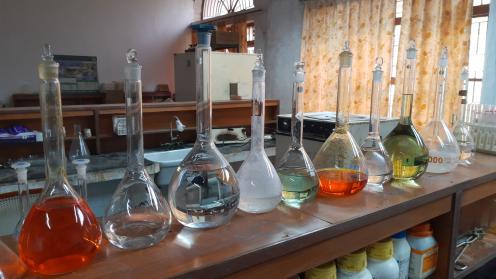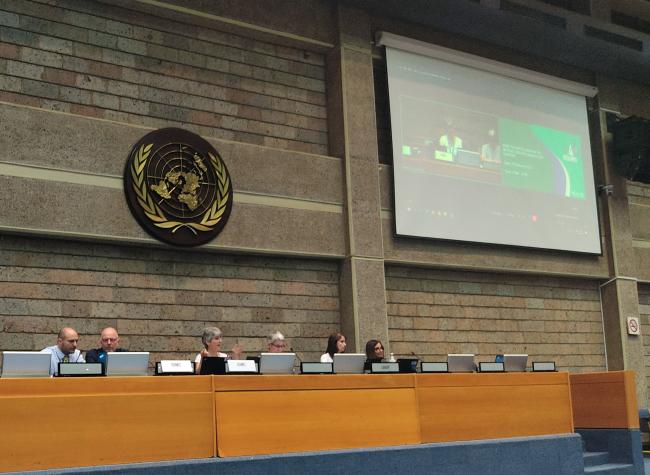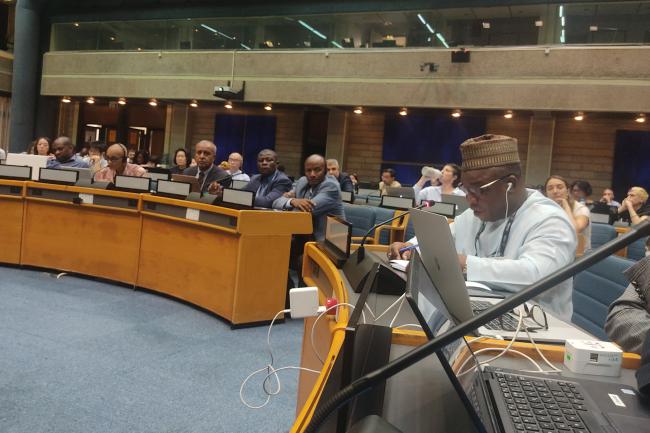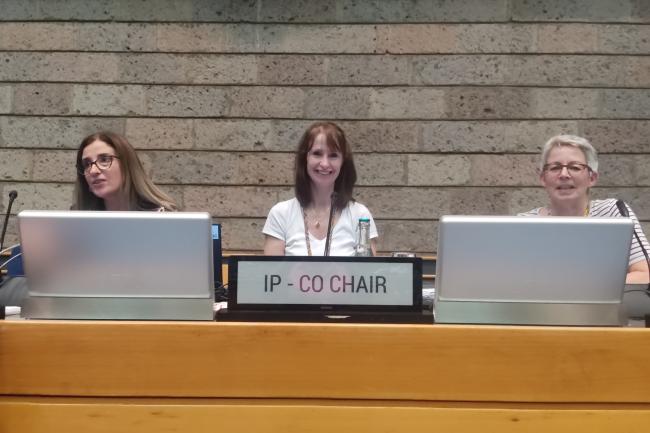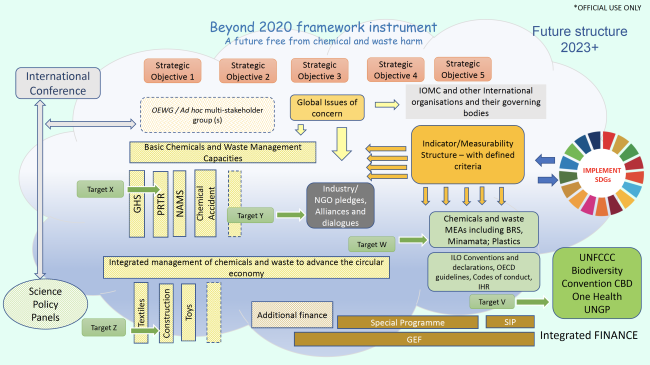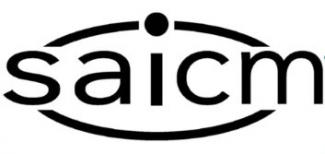Delegates to the resumed fourth session of the Intersessional Process for Considering the Strategic Approach to International Chemicals Management (SAICM) and the Sound Management of Chemicals and Waste Beyond 2020 (IP4) met on Saturday, 25 February 2023, for two technical briefings.
The first briefing was divided into two parts, with the first part focusing on the outcomes of an Inter-Organization Programme for the Sound Management of Chemicals (IOMC) global workshop held on 18-19 January 2023 in Paris on advancing chemicals and waste management in economic sectors. Delegates further discussed an IOMC proposal for a set of inclusive Implementation Programmes under the “Beyond 2020” Framework, thus strengthening implementation through stakeholder engagement, knowledge-sharing, and multi-stakeholder collaboration.
The second briefing featured the IP Co-Chairs’ expectations for the resumed IP4, including identifying possible gaps in the current text, ensuring coherence throughout the document and hearing participants’ expectations for the fifth meeting of the International Conference on Chemicals Management (ICCM5).
Implementing the “Beyond 2020” Strategic Objectives and Targets through Inclusive Programmes: National systems, economic sector strategies and sustainable development decision making
The first session was moderated by Gabriela Eigenmann, Chair, IOMC, (UN Industrial Development Organization (UNIDO)). Welcoming participants, Anita Breyer, ICCM5 President (Germany), expressed hope that delegates would manage to finalize the document in preparation for ICCM5. She emphasized the willingness of downstream industry partners who attended the Paris workshop to engage on the issue of chemicals and waste management, and called on IOMC members to reach out to those sectors that have not been included in the chemicals and waste discourse as the biodiversity needs and risks associated with pesticides “desperately need our attention.”
Part I: Considering an Implementation Programme on “Integrating chemicals and waste management in chemical intensive economic sectors and value chains”
Achim Halpaap, UN Institute for Training and Research (UNITAR), highlighted the key outcomes from the Paris workshop, saying the draft targets captured in the Co-Chairs’ single consolidated document (SAICM/IP.4/10) provided the launch pad for the discussions. Halpaap referenced the three dimensions of integrated chemicals and waste management, including:
- development of chemical management systems and capacities in all countries through involving key ministries;
- integrated approaches to manage chemicals and waste in key industry sectors and product value chains, such as in agriculture, textiles, and electronics; and
- integration with broader economic and social, and sustainable development objectives, including decent work and innovation policies.
On the outcome related to the draft target on economic sector strategies (D6), he said participants had identified a need to scope the term “chemical intensive” sectors for consideration under the “beyond 2020” framework. Among ways of addressing cross-cutting topics in strategies, the workshop participants had urged enhanced transparency and flow of information, focusing on emerging policy issues, and engaging with small and medium enterprises as well as the informal sector.
On guiding principles to inform sector strategies, Halpaap presented recommendations from the workshop, including that:
- guiding principles can provide a solid benchmark for strategy development by companies, groups of companies or associations against an ambitious vision;
- companies, groups of companies or associations are encouraged to develop road maps based on an ambitious vision with milestones for continuous performance improvement;
- interacting and collaborating of industry with “enabling “ stakeholders can be an important factor in driving performance improvement; and
- the development of further and more detailed guidance would be valuable.
In conclusion, he urged delegates to think through how commitments of decision makers can be mobilized in advance of, and at, ICCM5, and mentioned organization of a stakeholder expert meeting on guiding principles and elements of a global implementation programme as a possibility.
Delegates provided feedback on the workshop outcomes, highlighting:
- the importance of positioning health and the healthcare sector as central to an instrument to address harmful chemicals, either through the appropriate treatment of patients or awareness of hazardous chemicals in healthcare;
- the need to move from strategies, bureaucratic requirements and frameworks to “real action”;
- development of clear guidelines and avoiding divisive approaches such as finger pointing and blaming;
- a greater emphasis on the entire life cycle of the value chain, in particular chemical and electronic waste; and
- the need to improve data collection to provide guidance for decision making.
Part II: Implementing the “Beyond 2020” strategic objectives and targets through inclusive Implementation Programmes
Halpaap introduced the elements of an IOMC conference room paper (CRP, SAICM/IP.4/CRP.4/Rev.1), noting the direct links to the strategic objectives and targets captured in the single consolidated document under review. As rationale for the proposal, he said the main purpose was to strengthen implementation of the “Beyond 2020” framework through inclusive stakeholder and sectoral engagement, knowledge sharing, multi-stakeholder collaboration and mobilization of additional resources. Regarding the characteristics of the three proposed programmes, he outlined, among others:
- for the programme on developing national chemical management systems and capacities in all countries and regions, participation of multi- and bi-lateral development cooperation agencies is essential to create synergies and foster coordination;
- for the programme on integrating sound chemical and waste management in chemical intensive economic industry sectors and value chains, knowledge sharing within and across sectors are key, and sector strategy development should be encouraged and actioned; and
- for the programme on integration of sound chemical and waste management in sustainable development decision objectives and processes, creation of linkages with other fora dealing with climate change, biodiversity, circularity and resource efficiency, among others, would help avoid potential negative trade-offs across Sustainable Development Goals (SDGs).
In the subsequent discussion, delegates noted many potential activities that could emanate from the programmes. Some asked if specific strategic objectives should be linked to each programme, and one participant requested clarification about the function of a CRP document. She also suggested that the targets of the IOMC programmes should be those of the 2030 Agenda for Sustainable Development, saying, “unless we make them front and center to our own refined targets, we would have failed.”
Halpaap explained that the programmes would support achievement of SDG targets by ensuring specific targets also include management of chemicals and waste management, such as in the construction and building industry.
Other comments called for effective mainstreaming of chemicals and waste management, including the private sector into all engagements, greater collaboration with industry to strengthen national systems on target setting, and avoiding trade-offs and regrettable solutions.
Scene setting for beyond 2020: IP Co-Chairs’ Expectations of IP4 Outcomes
IP Co-Chair Judith Torres (Uruguay) provided an overview of the work concluded since the first part of IP4 in August/September 2022, including the 2023 SAICM regional meetings. She cited the relevant information documents as well as the CRP, and highlighted:
- existing gaps in the single consolidated text and the need for enhancements and improvements in the introductory text, targets, stock taking of progress, financing and capacity building;
- the need to adequately strengthen sectoral and multi-stakeholder engagement and ownership under the new instrument;
- the need for further discussion on placement of some text while considering some parts of the text as static and dynamic; and
- having a common view from stakeholders on other recommendations for consideration by ICCM5, such as the name and adoption of a new instrument.
IP Co-Chair Kay Williams (UK) warned of a challenging week ahead and urged delegates to have a timeless vision of 2050 and beyond, to address gaps in the current document, to discuss the scope of a comprehensive set of IP recommendations and to agree on proposals for addressing these, while using clear and simple language to communicate the work.
Setting the scene for the week ahead, Co-Chair Williams presented the Co-Chairs’ expectations, including that:
- thematic groups address outstanding issues;
- Friends of the Co-Chairs consider: the overall coherence and overarching issues related to the single consolidated document, how gaps may be addressed, and inclusion of additional recommendations;
- targets and measurability are established to measure progress towards the vision and Strategic Objectives;
- mechanisms support implementation;
- financial considerations include innovative financing approaches and operationalize the three pillars of the integrated approach to financing; and
- the current text will be revised and edited to create a better instrument.
Regarding the Friends of the Co-Chairs, Williams emphasized that there will be no overlapping of these meetings with the thematic group discussions, and that the stocktaking session will take place as soon as possible.
IP4 President Breyer thanked the relentless efforts of the Co-Chairs throughout the process, and called for the same spirit of transparency from the participants. Reiterating the coming week as the last opportunity to produce a single consolidated document, she urged delegates to agree on “something that sets the tone as a powerful international instrument that can address the triple planetary crisis.”
Text written and edited by Suzi Malan.
All ENB photos are free to use with attribution. For the SAICM IP4, please use: Photo by IISD/ENB | Suzi Malan
To receive free coverage of global environmental events delivered to your inbox, subscribe to the ENB Update newsletter.
